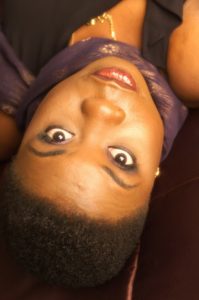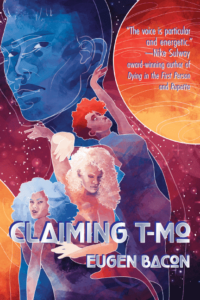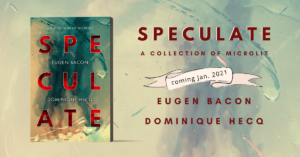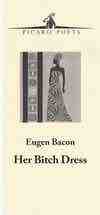
- What do new readers need to know about Eugen Bacon?
My writing is a curiosity, unconstrained by form or genre. I take on aspects of my characters, immerse myself into their worlds. The writing is a search, a coming through. It is also an invitation. Be at ease with my characters, with the places and languages I have shaped in ink.
- What was the inspiration for Claiming T-Mo?
The original name of the novel was Outbreeds, a breed of others. The black speculative fiction intends to engage with difference, with ‘otherness’, with being between worlds.
As I crafted it, I also explored one of my PhD research questions:
‘Can a writer of short fiction productively apply a model of stories-within-a-story to build a novel?’
I’m most comfortable as a writer of short stories. In Claiming T-Mo, I created purposeful adaptations, embedded vignettes, where the arrangement of stories, themes and collective protagonists hold the text together. The story flows smoothly from one point to another, each in part bearing a concealed self-sufficiency interlinked and layered into the composite. I wrote story by story, creating in a discipline already familiar.
- How did you come into contact with Meerkat Press?
This is how I do: I read something and love it—I look to see who published it. When I was in the Andromeda Spaceways Magazine editorial team, we ran a review of Keith Rosson’s Smoke City. I thought… this publisher is worth checking out. She was.
- When did you first know you wanted to be a writer?

My father was an eloquent writer. I still remember his letters, that beautiful scrawl. I’ve always been able to write from the core, to express, or find out, exactly how I feel. My lovers never had any doubts: passion or rage!
- You’ve also got a PhD – do you find that you can use any of that experience in your creative writing?
The PhD soared my writing. I understood my voice, and my hunger. My commitment, and focus. I could look at a problem, or a curiosity, and interrogate it like it was life or death. I explored the nature of selfhood within myself and within my characters and understood to interlace my immersion equally between scholarly and creative work.
- Who are your main literary influences?
I grew up on Enid Blyton, Margaret Ogola, Chinua Achebe, Camara Laye, Ng?g? wa Thiong’o. Along the way I discovered theorist and critical thinker Roland Barthes and his notion of play in the language of writing. Toni Morrison and her aptitude of seeing narrative as radical, as creating the writer at the very moment the work is being created. Kate Greville (The Secret River), Octavia Butler, J. R.R Tolkien, Peter Temple (Truth), Michael Ondaatje (Divisadero), Sapphire (Push), George R. R. Martin (have you read ‘The Lonely Songs of Laren Dorr’?)—all influential writers who offer me models to benchmark against.
- What made you decide to write your non-fiction book, Writing Speculative Fiction?
Writing Speculative Fiction was the exegetical part of my doctorate. As I shaped the thesis, abandoning the language of ‘academia’, I saw potential in a book that spoke to the reader, and encouraged writing as play. Many publishers rejected it, including Macmillan, but I reworked it, reshaped it, resubmitted it, and was astonished when Macmillan said, yes.
-
 You’ve done a few collaborations, the latest is Speculate with Dominique Hecq – how did that come about and what’s your approach to creative collaboration?
You’ve done a few collaborations, the latest is Speculate with Dominique Hecq – how did that come about and what’s your approach to creative collaboration?
Collaboration is trust and respect. My love affair with Dominique started when she supervised my creative writing PhD at Swinburne University. In our first meeting, she looked at me and said, ‘Write, or perish.’ In the course of my candidature I published over 30 creative-writing-as-research stories and peer-reviewed articles, and presented papers in 10 international conferences. Dominique was the mother, the sister, the lover, the friend who brought out the scholar and writer in me. It was inevitable we’d work together on a project.
- What can you tell us about your chapbook, Her Bitch Dress, from Ginninderra Press?

Prose poetry is the naughty child that refuses to be tamed. I love poeticity in text, musicality in words. I’m part of a prose poetry group run by the University of Canberra, led by Prof Paul Hetherington—its members are scholars across the world.
We respond to each other at random in a form of dialogue, words that cartwheel on a trigger: a word, a metaphor, a feeling. We attach and detach from the world in a safe and playful space, where we trial language across genres in its forms, and use text to disrupt or find meaning. Here’s the piece that inspired the chapbook’s title:
Her bitch dress
That long weekend, the jazz singer and her snippet of song full of scatting. The band with its clarinet and a guitar and a piano, and the man with a crimson shirt and an ebony bowtie behind the double bass shaped like a rowboat. She commanded the audience, so young—she’s only twenty—really captured you, my love, when she sang in that dress, her flowing, strapless dress the colour of burnt orange, ‘I’m so lucky to have loved you.’ You clutched my hand at her croon and gave her your soul.
- What’s next for Eugen Bacon?
I want to read more, to write more black people stories. I’ve finished black speculative vignettes on climate change—what happens when the water runs dry. Before that was a short story about a water runner, a futuristic fiction about the price of water.
Luna Press Publishing invited me to participate in an academia lunare project on worldbuilding in fantasy and science fiction. My contribution studies worldbuilding in Ng?g? wa Thiong’o’s The Perfect Nine: The Epic of G?k?y? and M?mbi – where he uses literary devices of worldbuilding through creation mythology, culture, nature and the otherworldly.
If all goes well, you’ll see new stories in upcoming anthologies. There’s also an afrofuturistic novel set in a socialist country.
Bio:
Eugen Bacon is African Australian, a computer scientist mentally re-engineered into creative writing. She is a board director of the Australian Society of Authors. Her work has won, been shortlisted, longlisted or commended in national and international awards, including the Bridport Prize, Copyright Agency Prize, Ron Hubbard’s Writers of the Future Award, Australian Shadows Awards and Nommo Award for Speculative Fiction by Africans. Publications: Claiming T-Mo, Meerkat Press. Writing Speculative Fiction, Macmillan. In 2020: Her Bitch Dress, Ginninderra Press; The Road to Woop Woop & Other Stories, Meerkat Press; Hadithi, Luna Press Publishing; Inside the Dreaming, NewCon Press.

